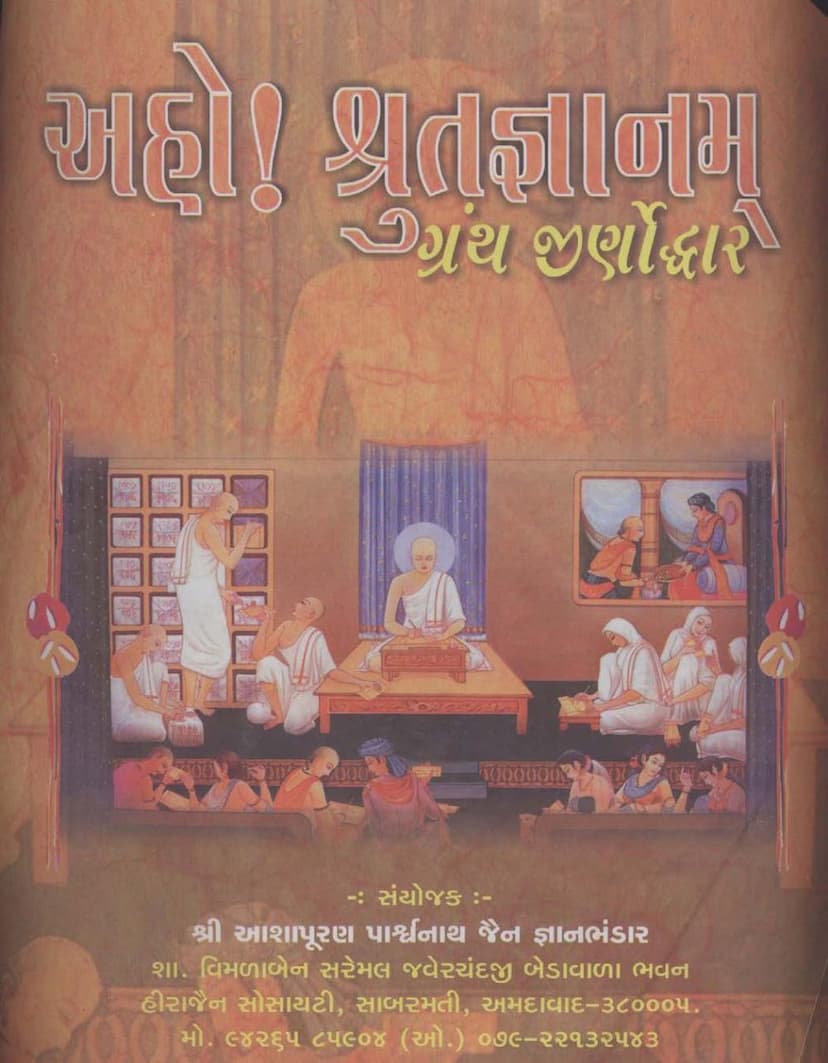Bharatiya Prachin Lipimala
Added to library: September 1, 2025

Summary
Here's a comprehensive summary of the provided Jain text, drawing from the introductory pages and the content outline of the book:
Book Title: Bharatiya Prachin Lipimala (Indian Ancient Paleography) Author: Gaurishankar Hirachand Ojha Publisher: Munshiram Manoharlal Publishers Pvt Ltd, New Delhi Catalog Link: https://jainqq.org/explore/009672/1
This document represents a collection of Jain texts, specifically focusing on the restoration and preservation (Jirnoddhar) of ancient scriptures. The core of the document details a catalog of 126 books that have been scanned and preserved.
Key Information and Themes:
- Preservation of Knowledge: The introductory pages emphasize the profound importance of "Shrut Gyanam" (knowledge obtained through scriptures). The initiative is dedicated to the "Jirnoddhar" (restoration/preservation) of valuable ancient texts, many of which are rare or on the verge of being lost.
- Inspiration and Sponsorship: The project is driven by the inspiration of Pujya Acharya Shri Omkarsuri Ji M.Sa. and Sadhvi Shri Kaivalya Ratnshri Ji M.Sa. The restoration efforts are supported by the Shri Ashapooran Parshwanath Jain Gyan Bhandar, specifically by the collection from the Shravika Upashray.
- Comprehensive Catalog: The bulk of the document is a detailed catalog of 126 books. These books cover a vast range of subjects, with a significant focus on Indian paleography, ancient Indian scripts, history, architecture, sculpture, and religious/philosophical literature.
- Subjects Covered by the Books: The catalog reveals a diverse collection, including:
- Paleography and Scripts: Books specifically deal with the history and decipherment of various Indian scripts like Brahmi, Gupta, Kutila, Nagari, Sharada, Bengali, Western, Central Provinces, Telugu-Canarese, Grantha, Kalinga, Tamil, Vatteluttu, and Kharoshthi. There are also sections on numerical symbols and the evolution of scripts.
- Jain Literature: Numerous titles are clearly Jain in origin, such as those related to Nandi Sutra, Uttaraadhyayan Sutra, Arhadvigta, Arhacchudamani, Nyaya Praveshah, Jain Granthavali, Jain Jyotish, Jain Lekh Sangrah, Jain Pratima Lekh Sangrah, Jain Stotra, and works by prominent Jain scholars like Pujya Vikramsuriji M.Sa., Pujya Jinvijayji M.Sa., and Pujya Meghvijayji Ganinim. Sa.
- Indian History and Culture: Titles like "Bharatiyen Prachin Lipimala," "Operation in Search of Sanskrit Manuscripts," "Gujaratna Aitihasik Lekho," and texts on Indian labor and culture are listed.
- Architecture and Sculpture: A significant portion of the catalog is dedicated to works on Shilpa Shastra, Vastu Shastra, Shilpa Ratnam, Prasad Tilak, Rajvallabha, and various architectural treatises.
- Philosophy and Logic: Texts related to Jain philosophy, logic (Nyayavrata), and various other philosophical schools are present.
- Astronomy and Astrology: Works like "Hirakalash Jain Jyotish" and texts related to "Vastu Prabhakar" are listed.
- Other Subjects: The catalog also includes works on Ayurveda, general knowledge, and collections of stories.
- Authorship and Editing: The catalog also lists the authors, commentators, and editors of these works, showcasing a lineage of scholars dedicated to preserving and disseminating knowledge.
- Purpose of the Initiative: The underlying purpose is to make these rare and valuable texts accessible to scholars and researchers for study and preservation, thereby safeguarding the rich intellectual heritage of India, particularly within the Jain tradition. The emphasis is on the importance of these primary sources for understanding India's past accurately.
In essence, "Bharatiya Prachin Lipimala" as presented in this document is a crucial undertaking to digitize and preserve ancient Indian texts, with a strong emphasis on Jain contributions to paleography, arts, sciences, and philosophy, ensuring that this knowledge remains available for future generations. The project highlights the ongoing effort to combat the natural decay of physical texts and the loss of knowledge due to time.